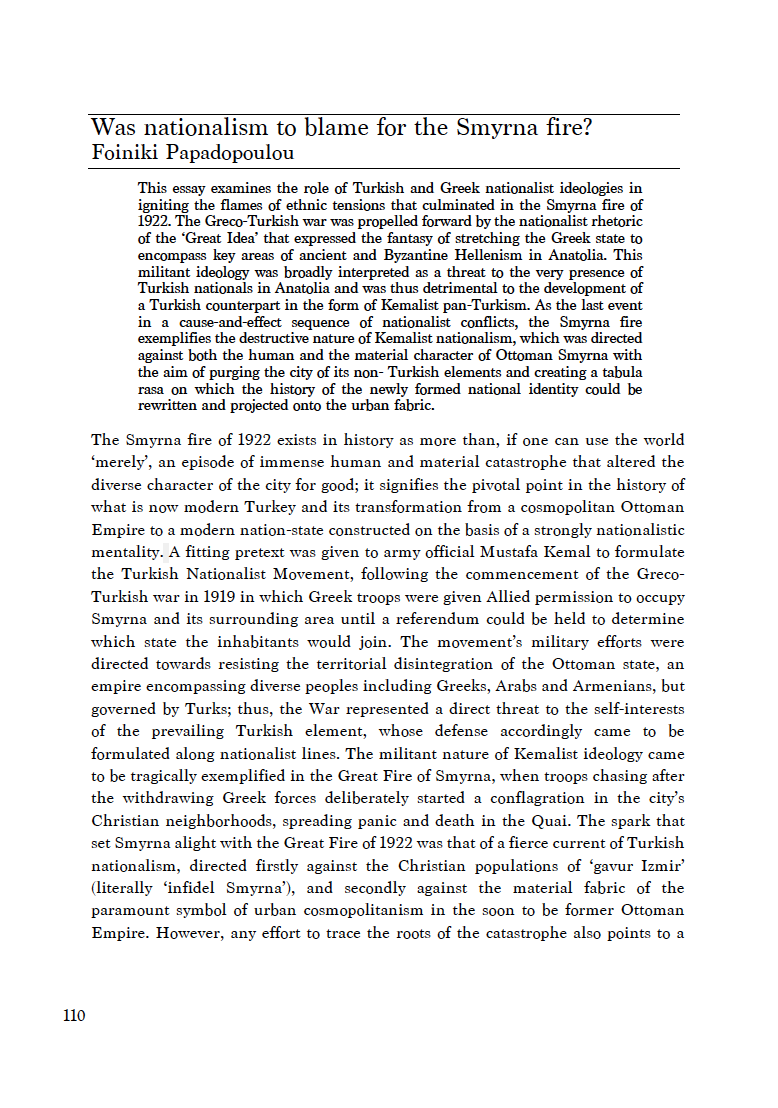Was nationalism to blame for the Smyrna fire?
DOI:
https://doi.org/10.36399/GroundingsUG.10.191Keywords:
Nationalism, Smyrna Fire, Greco-Turkish War, 1922, Hellenism, KemalismAbstract
This essay examines the role of Turkish and Greek nationalist ideologies in igniting the flames of ethnic tensions that culminated in the Smyrna fire of 1922. The Greco-Turkish war was propelled forward by the nationalist rhetoric of the ‘Great Idea’ that expressed the fantasy of stretching the Greek state to encompass key areas of ancient and Byzantine Hellenism in Anatolia. This militant ideology was broadly interpreted as a threat to the very presence of Turkish nationals in Anatolia and was thus detrimental to the development of a Turkish counterpart in the form of Kemalist pan-Turkism. As the last event in a cause-and-effect sequence of nationalist conflicts, the Smyrna fire exemplifies the destructive nature of Kemalist nationalism, which was directed against both the human and the material character of Ottoman Smyrna with the aim of purging the city of its non- Turkish elements and creating a tabula rasa on which the history of the newly formed national identity could be rewritten and projected onto the urban fabric.
References
Hortense Wood’s diary, Brian Giraud Archives, Izmir.
“HMS Iron Duke stands in the foreground against "an unbroken wall of fire, two miles long" in The Illustrated London News (September 30, 1922).
Kolettis, Ioannis, ‘Αddress to the National Assembly’ (1844) in Demaras, K.Th., Ellinikos Romantismos (Athens: Hermes, 1982).
Çalislar, Ipek, Madam Atatürk: The First Lady of Modern Turkey (Istanbul: Saqi Books, 2006).
Clogg, Richard, A Concise History of Greece (Cambridge: Cambridge University Press, 2016).
Gawrych, George W.,The Young Atatürk: From Ottoman Soldier to Statesman of Turkey, (New York: I. B. Tauris, 2003).
Kırlı, Biray Kolluoglu, ‘Forgetting the Smyrna Fire’, History Workshop Journal, no. 60. Oxford University Press: 25–44.
Mansel, Philip, Levant: Splendour and Catastrophe in the Mediterranean (London: Yale University Press, 2011).
Milton, Giles, Paradise Lost: Smyrna 1922: The Destruction of a Christian City in the Islamic World (New York: Basic Books, 2008).
Smith, Michael Llewellyn, Ionian Vision: Greece in Asia Minor (1919-1922) (London: St Martin’s Press, 1923).
Repousi, M., Andreadou, H., Poutachides, A. and Tsivas, A., Istoria St’ Demotikou: Sta neotera kai synchrona chronia (Athens: Organismos Ekdoseon Dedaktikon Vivlion, 2006). [6th Grade History: In the modern times].
Wratislaw, Albert Charles, A Consul in the East (Edinburgh: William Blackwood & Sons, 1924).
Zürcher, Erik, Turkey: A Modern History (London: I.B. Tauris, 2004).

Downloads
Published
Issue
Section
License
Copyright (c) 2017 Foiniki Papadopoulou

This work is licensed under a Creative Commons Attribution 4.0 International License.
The CC BY 4.0 license is a Creative Commons license. This is a non-copyleft free license that is good for art and entertainment works, and educational works. It is compatible with all versions of the GNU GPL; however, like all CC licenses, it should not be used on software. People are free to: Share — copy and redistribute the material in any medium or format; Adapt — remix, transform, and build upon the material for any purpose, even commercially. The licensor cannot revoke these freedoms as long as you follow the license terms. But they must conform to the following terms: Attribution — You must give appropriate credit, provide a link to the license, and indicate if changes were made. You may do so in any reasonable manner, but not in any way that suggests the licensor endorses you or your use. No additional restrictions — You may not apply legal terms or technological measures that legally restrict others from doing anything the license permits.
Please check individual article PDF copies to see if any additional restrictions apply.







